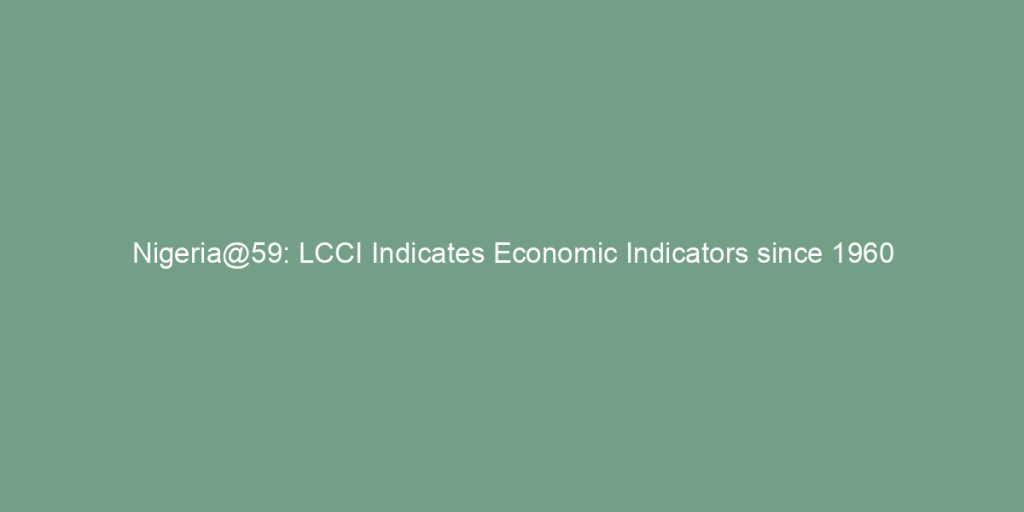LCCI Indicates Economic Indicators since 1960
In an interview with the Director-General of the Lagos Chamber of Commerce and Industry (LCCI), the economic indicators of Nigeria since its independence in 1960 were discussed. This insightful conversation touched on various aspects of the Nigerian economy and the challenges it faces today. Here, we break down the key points of the interview, highlighting the importance of addressing these issues for Nigeria’s economic growth and sustainability.
Understanding Nigeria’s Democratic Journey
Since gaining independence in 1960, Nigeria has experienced a mix of military and democratic rule. The interview acknowledged that Nigeria’s 20-year uninterrupted democratic experience is a positive development. Interestingly, the LCCI director mentioned that investors often have more confidence in democratic governments compared to military regimes.
Recognizing Economic Progress
The interview recognized that Nigeria has seen some improvements in the service sector, especially in financial services and telecommunications. The significant transformation in the telecoms sector over the years has been particularly noteworthy. Despite these advancements, there remains a significant gap between government promises and actual results.
The Challenge of Diversification
One of the key challenges facing Nigeria is diversifying its economy. The country has been overly reliant on oil and gas revenues, which have hindered the growth of other sectors like agriculture and manufacturing. The LCCI director expressed concern about the slow progress in diversifying the non-oil sector, which contributes significantly to GDP but generates less than 50% of government revenue.
Infrastructure and Integration
The interview highlighted the importance of addressing infrastructure challenges for economic growth. The director emphasized the need for domestic economic integration to facilitate the movement of goods within the country. Infrastructure, particularly in power generation, remains a significant bottleneck. The government’s commitment to power sector reforms is a step in the right direction, but there are legal and execution challenges to overcome.
Fiscal Responsibility
The interview touched on the fiscal challenges faced by the Nigerian government, including rising deficits. The director pointed out that some states are on the verge of insolvency. Addressing issues like revenue optimization, the cost of governance, and fiscal leakages is critical to fiscal stability.
Economic Advisory Council’s Role
The Economic Advisory Council, established by the government, will play a crucial role in shaping Nigeria’s economic policies. The council, consisting of technical experts and economists, will advise on key economic decisions. However, the success of these recommendations will depend on the government’s willingness to implement them.
Power Sector Reforms
The interview discussed the government’s initiative to modernize the National Grid and increase power generation. While the commitment is commendable, the director stressed the importance of addressing legal and implementation challenges in the power sector. Legal issues stemming from power sector reforms have created obstacles to progress.
Streamlining Foreign Exchange Management
Foreign exchange management plays a crucial role in attracting foreign investors. The interview emphasized the need for a unified foreign exchange rate to instill confidence in investors. Streamlining the multiple exchange rate windows and using a realistic conversion rate is essential to create a transparent and attractive foreign exchange market.
Reducing Borrowing
Nigeria’s borrowing has been a growing concern, with the annual debt approaching three trillion naira. The interview recommended reducing borrowing by exploring alternative sources of funding for infrastructure projects. Public-private partnerships (PPPs) can play a significant role in attracting private capital for these projects, reducing the burden on government finances.
In conclusion, the interview with the Director-General of the LCCI sheds light on the economic challenges and opportunities in Nigeria. While there have been positive developments, there are still significant obstacles to overcome, such as diversification, infrastructure improvements, fiscal responsibility, and power sector reforms. The role of the Economic Advisory Council will be pivotal in shaping the country’s economic future.
FAQs
1. What is the significance of Nigeria’s 20-year uninterrupted democratic experience?
- Nigeria’s uninterrupted democratic experience has instilled confidence in investors, making them more inclined to invest in the country. This stability is a positive factor for economic growth.
2. Why is diversifying Nigeria’s economy important?
- Diversification is essential to reduce the country’s overreliance on oil and gas revenues and promote the growth of other sectors like agriculture and manufacturing.
3. What are the challenges in the Nigerian power sector reforms?
- Legal issues and execution challenges have hindered progress in the power sector reforms, and addressing these issues is crucial for the success of the initiative.
4. How can Nigeria attract foreign investors through foreign exchange management?
- By streamlining foreign exchange rates and using a realistic conversion rate, Nigeria can create a transparent and attractive foreign exchange market that instills confidence in foreign investors.
5. What is the role of the Economic Advisory Council in Nigeria’s economic policies?
- The Economic Advisory Council, comprising technical experts and economists, advises on key economic decisions. Its recommendations will shape Nigeria’s economic future if implemented effectively.




